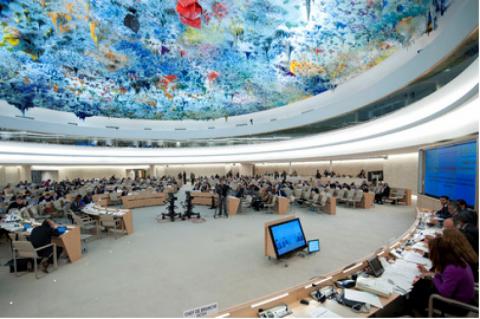
On 25 September 2015, the Human Rights Council (HRC) adopted the outcome report of Libya's second Universal Periodic Review (UPR) held at the Palais des Nations in Geneva in May. The review revealed that the Libyan authorities still had a long way to go to improve the general human rights situation. One of the key issues raised was the protection of civilians, especially human rights defenders, journalists, judges and prosecutors. In view of the deteriorating human rights situation in the country, the Libyan authorities' lack of will to address the major issues in the country is deeply concerning.
Progress could be made implementing States' recommendations
Firstly, it must be noted that Libya could greatly improve the country's human rights situation if it implemented the recommendations it itself accepted during its review in May 2015. In fact, of the 202 recommendations submitted by States, Libya had accepted 171, noted 28 and rejected 2.
Moreover, the accepted recommendations − such as accepting to ratify the Optional Protocol to the Convention against Torture and Other Cruel, Inhuman or Degrading Treatment or Punishment (OPCAT), or to strengthen efforts to investigate all allegations of torture, summary executions, enforced disappearance and other abuses − could be a regarded as a step in the right direction, but Libya's little interest in cooperating with the International Criminal Court (ICC) cast doubts on the real will of the authorities to actually investigate these crimes and bring the perpetrators to justice.
Most concerning was the intervention of the Chargée d'affaires of the Libyan Permanent Mission in Geneva, Ms Salwa Eldaghili, who stated that, considering the protracted conflict taking place in Libya since 2014 which seriously weakened the central State, the 171 recommendations could not be implemented as long as no political solution was found between the belligerents. In fact, the security challenges in the country, she explained, were mostly due to the presence of "terrorist groups" like the Islamic State of Iraq and the Levant (ISIL).
As a consequence, Libya made it clear that it could not accept Turkey's recommendation to end the prevailing climate of impunity by taking immediate measures "to ensure that forces loyal to the Government are made accountable for their indiscriminate targeting of civilians, civilian vessels as well as civilian property and infrastructure, in order to end the atmosphere of impunity".
Lenient States v critical NGOs
Alkarama is also concerned about the lenient attitude of some States present at the session, who were alternately congratulating Libya for its efforts. Their views appeared in stark contrast with those of the NGOs present at the session, who adopted a more critical perspective.
Among other issues, NGOs reminded the HRC that Libya had failed to establish a mechanism for transitional justice; urged the government to adopt a national strategy to regulate the circulation of weapons in the country, recalling that all militias and armed faction should be disarmed regardless their respective political affiliation; and called for accountability of forces loyal to the government, insisting that the Office of the High Commissioner for Human Rights (OHCHR) Investigation Mission team investigates crimes committed by all parties to the conflict during its coming mission in Libya, in accordance with its mandate "to investigate alleged violations and abuses of human rights in Libya" including actions by both State and non-State actors from 1 January 2014 to the present.
"As long as there is no government representative of all Libyan people and with strong presence in the country, the review doesn't make much sense," expressed Alkarama's Legal Director, Rachid Mesli, adding that "meanwhile, it is important that all parties to the conflict respect the principles of international humanitarian law to cease all violations and pave the way for a brighter future."
In view of Libya's enormous potential to improve its human rights situation simply by implementing the recommendations it has already accepted, Alkarama calls on the Libyan authorities to implement them without delay in order to put an end to the severe human rights violations in the country.
For more information or an interview, please contact the media team at media@alkarama.org (Dir: +41 22 734 1008).
